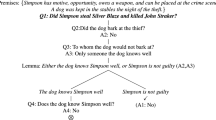Abstract
The so-called theory of karma is one of the distinguishing aspects of Hinduism and other non-Hindu south-Asian traditions. At the same time that the theory can be seen as closely connected with the freedom of will and action that we humans supposedly have, it has many times been said to be determinist and fatalist. The purpose of this paper is to analyze in some deepness the relations that are between the theory of karma on one side and determinism, fatalism and free-will on the other side. In order to do that, I shall use what has been described as the best formal approach we have to indeterminism: branching time theory. More specifically, I shall introduce a branching time semantic framework in which, among other things, statements such as “state of affairs e is a karmic effect of agent a”, “a wills it to be the case that e” and “e is inevitable” could be properly represented.
Similar content being viewed by others
References
Belnap, N., Green, M.: Indeterminism and the thin red line. Philos. Perspect. 8, 365–388 (1993)
Belnap, N., Perloff, M.: Seeing to it that: a canonical form for agentives. Theoria 54, 175–199 (1988)
Belnap, N., Perloff, M.: The way of the agent. Studia Logica 51, 463–484 (1992)
Belnap, N., Perloff, M., XU, M.: Facing the Future: Agents and Choices in Our Indeterministic World. Oxford University Press, Oxford (2001)
Benovsky, J.: Branching and (in)determinism. Philos. Papers 42, 151–173 (2013)
Borghini, A., Torrengo, G.: The metaphysics of the thin red line. In: Correia, F., Iacona, A. (eds.) Around the Tree: Semantical and Metaphysical Issues Concerning Branching and the Open Future, pp. 105–125. Kluwer, Dordrecht (2013)
Chadha, M., Trakakis, N.: Karma and the problem of evil: a response to Kaufman. Philos. East West 57, 533–556 (2007)
Chapple, C.: Karma and Creativity. State University of New York Press, Albany (1986)
Chellas, B.: Time and modality in the logic of agency. Studia Logica 51, 485–518 (1992)
Clooney, F.: Evil, Divine omnipotence, and human freedom: Vedanta's theology of karma. J. Religion 69, 530–548 (1989)
Creel, A.: Contemporary philosophical treatments of karma and rebirth. In: Neufeldt, R. (ed.) Karma and Rebirth. Post Classical Developments, pp. 1–14. State University of New York Press, Albany (1986)
Earman, J.: A Primer on Determinism. Reidel, Dordrecht (1986)
Fitting, M.: Basic Modal Logic. In: Gabbay, D., Hogger, D., Robinson, J. (eds.) Handbook of Logic in Artificial Intelligence and Logic Programming, vol. 1, pp. 365–448. Oxford University Press, Oxford (1993)
Ginet, C.: On Action. Cambridge University Press, Cambridge (1990)
Hoefer, C.: Causal Determinism. In: Zalta, E. (ed.) Stanford Encyclopedia of Philosophy. http://plato.stanford.edu/entries/determinism-causal/ (2016)
Horty, J., Belnap, N.: The deliberative stit: a study of action, omission, ability and obligation. J. Philos. Logic 24, 583–644 (1995)
Humphreys, C.: Karma and Rebirth. Curzon Press, London (1983)
Jaini, P.: Karma and the problem of rebirth in Jaininsm. In: O'Flaherty, W. (ed.) Karma and Rebirth in Classical Indian Traditions, pp. 217–238. Motilal Banarsidass, Delhi (1983)
Kaufman, W.: Karma, Rebirth, and the problem of evil. Philos. East West 55, 15–32 (2005)
Kaufman, W.: Karma, Rebirth, and the Problem of Evil: A Reply to Critics. Philosophy East and West 57, 559–560 (2007)
Long, B.: The concepts of human action and rebirth in the mahabharata. In: O'Flaherty, W. (ed.) Karma and Rebirth in Classical Indian Traditions, pp. 38–60. Motilal Banarsidass, Delhi (1983)
Mackie, J.: The Cement of the Universe: A Study on Causation. Clarendon Press, Oxford (1974)
McDermott, J.: Karma and rebirth in early budhism. In: O'Flaherty, W. (ed.) Karma and Rebirth in Classical Indian Traditions, pp. 165–192. Motilal Banarsidass, Delhi (1983)
Mill, J.S.: A System of Logic, Ratiocinative and Inductive: Being a Connected View of the Principles of Evidence, and the Methods of Scientific Investigation. Cambridge University Press, Cambridge (2011)
Neufeldt, R. (ed.): Karma and Rebirth. Post Classical Developments. State University of New York Press, Albany (1986)
O'Flaherty, W. (ed.): Karma and Rebirth in Classical Indian Traditions. Motilal Banarsidass, Delhi (1983)
O'Flaherty, W.: Karma and Rebirth in the vedas and puranas. In: O'Flaherty, W. (ed.): Karma and Rebirth in Classical Indian Traditions, pp. 3–37. Motilal Banarsidass, Delhi (1983)
Perrett, R.: Karma and the Problem of Suffering. Sophia 24, 4–10 (1985)
Radhakrishnan, S.: Indian Philosophy, vol. I. Macmillan, New York (1923)
Reichenbach, B.: Law of Karma: A Philosophical Study. University of Hawaii Press, Hawaii (1991)
Rice, H.: Fatalism. In: Zalta, E. (ed.) Stanford Encyclopedia of Philosophy. http://plato.stanford.edu/entries/determinism-causal/ (2014)
Rocher, L.: Karma and rebirth in the dharmasastras. In: O'Flaherty, W. (ed.) Karma and Rebirth in Classical Indian Traditions, pp. 61–89. Motilal Banarsidass, Delhi (1983)
Segerberg, K.: Getting started: beginnings in the logic of action. Studia Logica 51, 347–358 (1992)
Sharma, A.: Karma, rebirth, and the problem of evil: an interjection in the debate between Whitley Kaufman and Monima Chadha and Nick Trakakis. Philos. East West 58, 572–575 (2008)
Suryanarayanan, S.: Karma and fatalism. Philos. Quart. (India) 16, 70–95 (1940)
Vanderveken, D.: Attempt, success and action generation: a logical study of intentional action. In: Vanderveken, D. (ed.) Logic, Thought and Action, pp. 315–342. Springer, Dordrecht (2005)
Author information
Authors and Affiliations
Corresponding author
Additional information
Work partially supported by CNPq (National Counsel of Technological and Scientific Development of Brazil), public notice MCT/CNPq No 14/2013.
Rights and permissions
About this article
Cite this article
Silvestre, R.S. Karma Theory, Determinism, Fatalism and Freedom of Will. Log. Univers. 11, 35–60 (2017). https://doi.org/10.1007/s11787-016-0154-z
Received:
Accepted:
Published:
Issue Date:
DOI: https://doi.org/10.1007/s11787-016-0154-z




